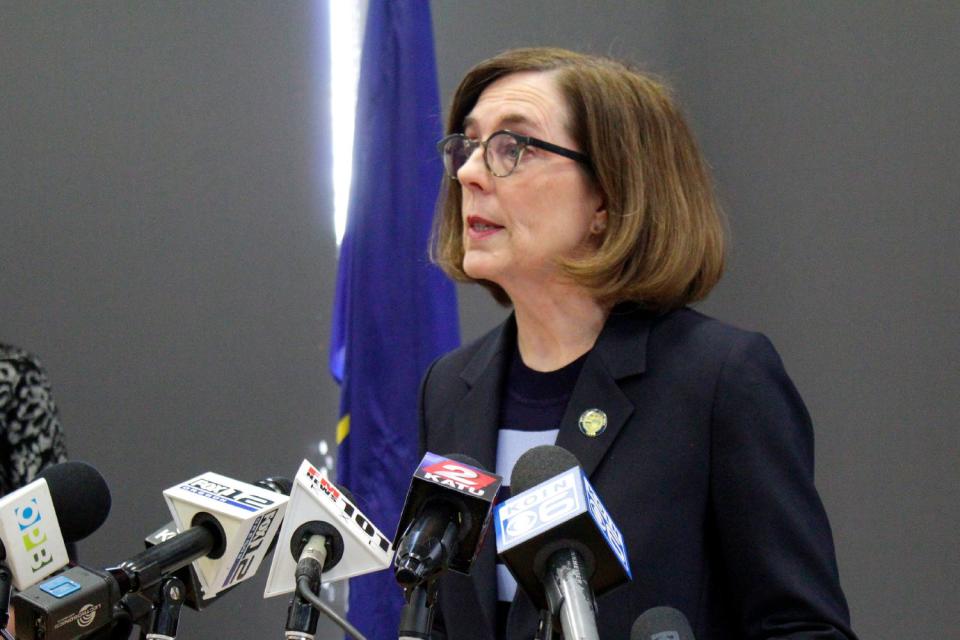Summer setback: Cities put brakes on reopening as virus spikes again
Sharp spikes in coronavirus cases are prompting governors and mayors in Oregon, Utah and Tennessee to pause reopening plans, while officials in Houston and elsewhere are warning of the potential need for new restrictions.
The moves could be a harbinger of more slowdowns to come, with coronavirus infections and hospitalizations rising in more than a dozen states since Memorial Day weekend. But most state and local leaders have so far been reluctant to halt reopenings or reimpose restrictions, worried about further damaging economies or aggravating shutdown-fatigued residents. President Donald Trump and administration officials have meanwhile urged states to keep moving forward.
Oregon’s Democratic Gov. Kate Brown announced Thursday night she would pause reopening plans for at least one week after the number of daily new infections nearly doubled in the past week.
“The virus makes the timeline,” Brown said. “We don’t make the timeline.”
Utah Republican Gov. Gary Herbert earlier this week issued a similar weeklong pause. Nashville Mayor John Cooper, a Democrat, also halted reopening plans, citing a growing outbreak in the southeast part of the city, though citywide cases have declined in the past month.
The Trump administration, eager for an economic reboot, has downplayed the recent spike in coronavirus cases and attributed it to an expansion of testing and virus tracing. However, public health experts say increasing hospitalizations and positivity rates for coronavirus tests are worrying signals the virus is spreading in some of the first areas to open up over a month ago.
“There is no emergency, there is no second wave,” said White House economic adviser Larry Kudlow Friday, dismissing the idea of further widespread shutdowns. “What you do have is certain spots are seeing a little bit of a jump up.”
Trying to project a return to normalcy, Trump this week announced plans to hold his first campaign rally in months at a large indoor arena in Tulsa, Okla., next Friday. Public health experts, including the CDC on Friday, have warned large gatherings in confined places pose a high risk for infection.
The administration has largely deferred reopening plans to the states, with few following the White House’s suggested guidelines. CDC Director Robert Redfield on Friday said it’s possible some states or communities would need to shut down again if the virus keeps spreading but said those decisions will be made by local leaders. HHS Secretary Alex Azar on Friday also said any future shutdowns would be more localized.
“We think we have the tools we need to avoid the shutdowns in the future – at least on a national level,” Azar told reporters in a visit to a Boston hospital on Friday. “There could be isolated communities that have outbreaks that may create the need to implement mitigation measures.”
Most of Texas is moving forward with reopening amid record-breaking levels of hospitalizations, but Houston-area officials this week announced possible plans for reimposing stay-at-home orders. They introduced a new threat-level ranking system that now warns of a “significant and uncontrolled” level of Covid-19 cases.
“It feels like we’re going back to where we were several months ago,” said Umair Shah, a top public health official in Harris County, an area that includes Houston.

States opting against stricter measures are instead urging residents to take personal responsibility for their safety.
On Wednesday, Alabama saw the largest spike in Covid-19 cases, and hospitalizations have also reached a new high.
“With ongoing community transmission, it is safer to be at home,” the state’s public health department said in a news release, adding that the state has seen large outbreaks in workplaces and cases linked to large gatherings during Memorial Day.
The U.S. leads the world in coronavirus cases, surpassing 2 million earlier this week. The recent surge in cases is in part due to increased testing, from 6 million tests at the end of April to nearly 22 million as of this week.
Michael Mina, a professor at Harvard’s School of Public Health, said debates over reopening are difficult because many states still don’t have the capacity to trace the virus.
“Most places continue to fly blind,” he said. “And that handcuffs people and forces them into a position where one of their only solutions is to close down again.”

